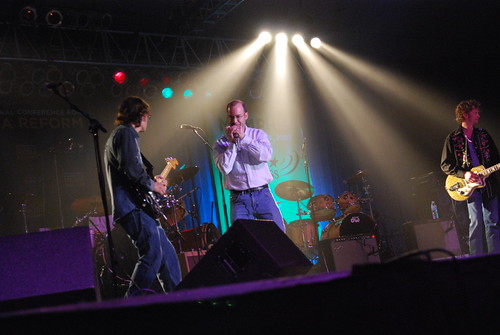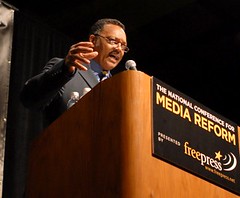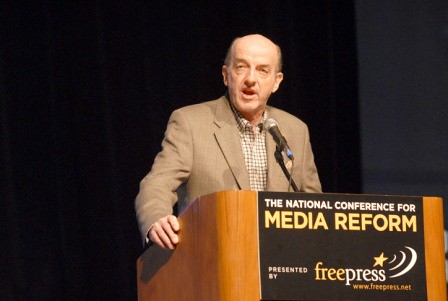The Rev. Dr. Martin Luther King Jr., whose legacy was celebrated and evoked throughout the weekend in Memphis, often challenged the U.S. media to do a better job covering all aspects of the civil rights movement.
 |
On Friday afternoon, Reverend Jesse Jackson told 3,000 activists and organizers that American establishment media only valued Dr. King as long as he advocated non-violent protest. But when King began to critique American institutions, he "disturbed the status quo."
"When dogs bit and horses kicked and he said, 'Don't fight back,' they said: 'This is the type of leader we've been looking for.' But when he challenged the assumption of white male supremacy, its institutions and war policy, the government then began to attack him."
Light a Flame in the Darkness
Jackson said "[King] brings us to this point today, 40 years later, to define the great issues of our time -- the broken promises, the new schemes of denials, the impact of a media that freezes out democracy, the media that looks at the world through a key hole and not the door."Jackson expressed concern that the media has the capacity "to play a bigger role to make America better. And that's why this idea of media concentration is a bad proposition."Jackson urged the Memphis audience to push for more diversity in media ownership, and more access to media making and independent news in their communities "no matter the difficulty or cost."
Take Back the Pen
While in Memphis, award winning television journalist Bill Moyers spoke of the legacy of Dr. King's struggle when he compared big media corporations to plantation owners and American media consumers to their slaves.
"What happened to radio, happened to television, and then it happened to cable. If we are not diligent, then it will happen to the Interent [creating] a media plantation for the 21st Century dominated by the same corporate and ideological forces that have controlled the media for the last 50 years.""[When a slave says] the boss man has been lying to me. Something is wrong with this system," Moyers said. "This is the moment when freedom begins. The moment you realize someone else has been writing your story and it's time you took the pen from his hand and started writing it yourself."
"When the garbage workers struck here in 1968 and the walls of these buildings echoed with the cry: 'I am a man,' they were writing their story. Martin Luther King came here to help them tell it, only to be shot dead on the balcony of the Lorraine Motel. The bullet killed him, but it couldn't kill the story because once the people start telling their own story you can't kill it anymore."
Build from the Ground Up
Malkia Cyril of the Youth Media Council asked people to consider what it would take to build a movement with the power to tell our own stories and overcome the injustices of the media system.
"Our movement must have leadership from the ground up," she said, advocating that more resources and attention be devoted to supporting local constituencies and genuine grassroots efforts."Our movement is both long and strong," Cyril said. "Backwards and forwards, and our memories and our strategies must be long as well."
In the Conference's closing keynote address, Van Jones asked people if they were prepared to succeed in the media and democracy movement."Can we write that story?" he asked. "We have to begin to say what is our agenda and is our agenda inclusive enough? Will it lift up enough people?"
Dream Hopeful Dreams
Jones, who is the founding director of the Ella Baker Center for Human Rights, called for a "city-by-city access agenda" outlining a vision to make high speed Internet free to everyone.
We have to think big, Jones said.
"Martin Luther King Jr didn't get famous giving a speech called, 'I have a complaint.' That wasn't the speech … The brother had a dream and we have dreams, beautiful dreams, hopeful dreams, helpful dreams, dreams about a country coming back together."
"The reason we have this pro-democracy movement is because we believe this country can lead the world," Jones said. "We need to be able to have a movement that stands for that."










